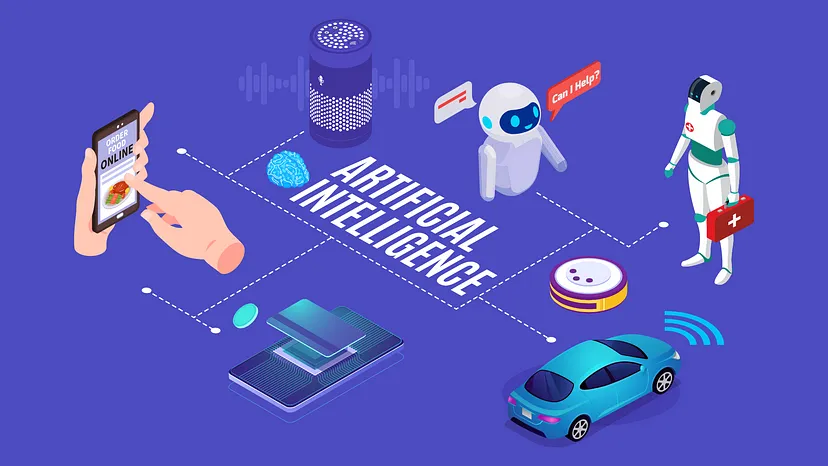When people hear the term “artificial intelligence,” many think of futuristic robots or complex machines taking over jobs. But in reality, AI has quietly woven itself into our everyday lives in ways most of us don’t even notice. From your morning routine to your evening entertainment, artificial intelligence is working behind the scenes to make life smoother, faster, and more efficient.
In this article, we’ll explore 10 practical ways AI is already helping you in daily life — whether you’re at home, on the road, shopping, or just scrolling through your phone.
1. Smartphones That Understand You
Your smartphone is one of the most AI-powered devices you own. Whether it’s voice assistants like Google Assistant or Siri, or facial recognition used to unlock your phone, AI is at the core of it.
- Voice commands like setting reminders, calling contacts, or searching the web are powered by natural language processing (NLP).
- Predictive text and autocorrect use AI to understand your typing habits and suggest better words.
- AI even helps optimize battery life and app usage based on your daily behavior.
Real impact: Your smartphone becomes more personalized and efficient, all thanks to AI.
2. Online Shopping Suggestions
Ever noticed how online shopping sites seem to “know” what you want before you even search for it? That’s AI at work.
- E-commerce platforms use machine learning algorithms to analyze your browsing and purchase history.
- They recommend products you’re more likely to buy.
- Prices and promotions are dynamically adjusted based on demand, location, and buying behavior.
Real impact: You save time and often discover better deals or products suited to your taste.
3. Navigation and Traffic Updates
Whether you’re using Google Maps, Apple Maps, or a ride-hailing app like Uber, AI is guiding you behind the scenes.
- AI processes real-time traffic data, road closures, and user reports.
- It helps provide the fastest route, avoiding jams and construction.
- Ride-sharing apps use AI to match drivers with passengers and optimize pricing based on demand.
Real impact: You get to your destination faster and more reliably.
4. Streaming Recommendations
When you’re watching a show on Netflix, listening to music on Spotify, or browsing videos on YouTube, AI is helping you discover content.
- Platforms track what you watch or listen to and when.
- AI algorithms then recommend similar content based on your preferences and habits.
Real impact: Less time searching for entertainment, more time enjoying what you love.
5. Email and Spam Filtering
Your email inbox is cleaner and safer because of AI.
- Email providers like Gmail use machine learning to filter out spam, phishing attempts, and promotional emails.
- AI also helps prioritize important messages in your “Primary” tab.
Real impact: You waste less time on junk mail and avoid falling for online scams.
6. Social Media Feeds
AI decides most of what you see on social media platforms like Facebook, Instagram, and Twitter (now X).
- The algorithm ranks posts based on your interests, likes, and interactions.
- AI helps detect fake news, abusive content, and spam accounts.
Real impact: Your feed is more relevant, and the platform becomes safer and more engaging.
7. Online Banking and Fraud Detection
When you use online banking or payment apps, AI keeps your transactions secure.
- Banks use AI models to detect unusual activity or potentially fraudulent transactions.
- AI chatbots also help you resolve simple queries instantly.
Real impact: You enjoy safer and quicker banking services without waiting in long queues.
8. Voice Assistants at Home
Smart speakers like Amazon Echo (Alexa), Google Nest, or Apple HomePod are built on AI.
- You can control lights, thermostats, appliances, and even order groceries by simply speaking.
- AI learns your voice patterns and preferences to offer better assistance over time.
Real impact: Your home becomes more convenient and personalized with voice control.
9. Healthcare Support
AI is becoming an invisible partner in managing personal health and fitness.
- Fitness apps track your steps, calories, and sleep patterns using AI.
- Smartwatches monitor heart rate, oxygen levels, and detect irregularities.
- AI is even being used by doctors to interpret X-rays and diagnose diseases faster.
Real impact: You get smarter health insights and better preventive care at your fingertips.
10. Customer Service and Chatbots
Whether you’re shopping online or booking a service, AI chatbots are likely your first point of contact.
- Chatbots answer frequently asked questions, track orders, and help resolve complaints.
- They use natural language processing to understand and reply in a human-like manner.
Real impact: Faster, 24/7 customer support without needing to wait for a real person.
Bonus: AI in Indian Daily Life
India is rapidly adopting AI-driven solutions. Some interesting examples include:
- Smart farming: AI helps predict crop yield and monitor soil health.
- Education apps like Byju’s and Vedantu use AI to personalize learning.
- Aadhaar verification systems use facial recognition and biometric AI for security.
Even regional languages are seeing voice recognition improvements, making AI more accessible in every corner of the country.
Final Thoughts
Artificial intelligence isn’t some distant, complex technology meant only for scientists or techies. It’s already here — in your pocket, in your home, at your bank, and even in your entertainment. It’s helping you save time, stay safe, make smarter choices, and live more conveniently.
As AI continues to grow and evolve, we can expect it to bring even more impactful changes in how we work, communicate, and live. The key is to stay aware, adapt to these tools smartly, and use them to improve the quality of everyday life.
